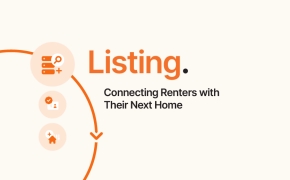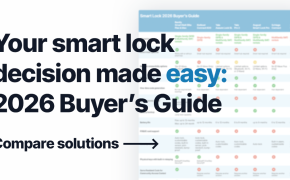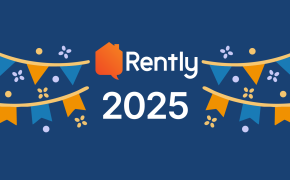It’s fun to think about innovations that we once considered “scary” and now consider “safe” — online shopping, mobile banking, automobile GPS, etc. Today, it’s hard to remember a time when these activities were not part of our daily lives. However, it’s also true that before we embraced these innovations, we questioned them. Would they actually work? Are they secure? Will they really make our lives better? Today’s property managers find themselves asking similar questions when considering new leasing technologies. Not surprisingly, these new technologies seem scary at first. To help managers overcome their concerns, Rently offers a smart leasing platform with security checks that reduce risk at every step of the resident lifecycle.

Multipoint Security Checks
Rently’s smart leasing platform provides property managers with 5 robust and proven security features. These help prevent online rental scams, safeguard self-guided tours, detect rental application fraud, and protect property assets.
1. Rently Security Checks for Listings
Typically, the leasing life cycle begins with a property listing. Property managers increasingly use Internet listing sites (ILS) to advertise vacancies, as most renters find their next home online.
According to Zillow (2022 Report), 74% of renters now search for properties online using a mobile device.
To meet this demand, Rently created Rently Listings. Our popular ILS receives 10 million visits and activates 3 million self-guided tours each year!
Rently Listings exclusively showcases properties that use Rently to offer self-guided tours and smart home amenities. From there, renters can quickly find a smart home property and schedule a convenient, self-guided tour or an agent-led tour.
With Rently, listing and finding properties is easy. However, all online activity has risks, and Internet property searches are no exception.
Increasingly, online scammers abound. For instance, “social engineering” is a popular scam. It occurs when a legitimate property listing is copied and reposted on other Internet websites (such as Facebook or Craigslist). The scammer then adds their own contact information and pretends to be the property owner. As a result, renters interact with the scammer and get fooled into sending them money for rental deposits, etc.
Fortunately, all properties on Rently Listings are 100% real!
Rently carefully verifies every property management company that lists on our site, and provides the ability for managers to watermark their property photos with their name and contact info.
In addition, our listing site warns renters that Rently-verified properties do not appear on Facebook or Craigslist. Rently offers onsite signage that warns touring renters that the property they are self-touring should only have been posted on Rently Listings.
Taking steps early to eliminate fraud demonstrates Rently’s serious commitment to providing a secure property leasing experience.

2. Rently Security Checks for Pre-Tour Screening
In addition to verifying property listings and their associated property management contacts, Rently also screens renters.
From the Rently Listings site, rental prospects are invited to create an account in order to schedule a tour. To do this, a renter must provide basic contact information, credit card details, a government-issued photo ID, and a selfie photo.
Renter photos are run through very specific verification criteria, including:
- Selfie “liveness” check
- Selfie-to-ID portrait comparison
- Matching government ID number across different accounts
- Matching ID details from the front and back barcode of the ID
- Check for possibility of ID fabrication
If any one of these photo verification criteria are not met, Rently will not create the account. However, if the photo verification criteria is met, a renter’s account is activated. As an ongoing security feature of an activated Rently account, 2-factor login authentication is always required.
Later, when a renter arrives onsite for a tour, they are asked to upload a live selfie photo to their Rently account via our app or a web link. The live onsite selfie photo will be matched (using facial recognition) to their account photos. This ensures that the person who scheduled the tour, with their account, is the same as the person taking the tour. Similarly, prospects’ phone numbers are verified upfront and later matched to the device used by the touring renter.
Also, once onsite, rental prospects must pass through a series of additional security screenings before they are granted physical access to tour a home.
For example, renters are asked to complete a “Beware of Scams” screen test asking them questions about their property search. This will alert them if they are being scammed by a fake property manager. Once that potential scam possibility is eliminated, the next screening test prompts a renter to confirm their actual presence onsite. They are asked to answer a series of questions unique to the property and also politely asked to temporarily turn off any VPN feature on their mobile device that may be hiding their actual location.
Finally, prior to receiving a property access code, an onsite renter is asked to enter a unique serial number visible on the smart lockbox or smart lock of the residence they wish to tour.
Rently’s industry-leading pre-tour screening system works in sync with our ongoing fraud detection system to create a safe touring experience. Our “always on” fraud detection system is quickly alerted to suspicious behaviors, such as excessive tour scheduling, excessive users sharing one device, disposable email domains, and foreign device signals. Rently regularly scores account behavior and bans accounts that present a high security risk.
Taken together, the on and offsite security features of Rently’s self-guided touring solution create the safest self-guided touring experience on the market today.

3. Rently Security Checks for Property Access
The security of physical interfaces that enable self-guided touring is just as important as software security.
For instance, in order to automate a maintenance work order or secure a self-guided tour, there needs to be a smart property access device that acts as a gateway. That hardware must be tamper-proof otherwise all the software security in the world is meaningless.
Rently offers various secure hardware options. Our devices include a smart lockbox, various smart (keyless) locks, and a common area access panel.
All physical devices that connect to the Rently smart leasing platform are certified to the highest security standards.
Rently works with Kwikset™ and Yale™, top-tier lock manufacturers, who have achieved industry standard certifications from the Builders Hardware Manufacturers Association (BHMA). These smart locks offer tamper-resistant materials and alarms that sound if someone enters an incorrect access code more than 3 times. Also, Kwikset’s SmartKey Security™ is resistant to kick-ins, picks bumps, drills, and saws.
Rently’s Access Panel with Intercom allows for keyless entry into communities and to common areas with shared amenities, such as pools, gyms, and conference rooms. Smart access panels provide you with the security feature to create durational codes that allow residents, guests, and staff to enter a common area only during specific times. Managers also have the ability to ban access to residents who have violated community rules. Activity logs show who accessed a common area and when, providing helpful evidence should a breach occur.
In addition to being physically robust, Rently’s smart access devices communicate with each other using the encrypted Z-wave security protocol, which has demonstrated device security for more than a decade.
Controlling property access with secure hardware is another important layer of security provided by Rently.

4. Rently Security Checks for Smart Home
As we have seen above, Rently’s smart leasing technology secures all the steps leading up to lease signings – listings, tours, screenings and applications. To close the loop on the entire rental lifecycle, a Rently smart home secures the residency phase as well.
Thanks to Rently, smart leasing becomes smart living.
In fact, Rently’s secure leasing tools for managers eventually become the Rently secure smart home amenities that renters enjoy everyday.
The same smart locks that enable secure property access for prospects during tours later create a secure access system for residents and maintenance vendors.
Likewise, the same smart motion sensors that alerted property managers to any breaches during property tours later alert residents about intrusions. Just as property managers can quickly change or delete entry codes during the tour process, residents can do the same for guests or roommates.
The security benefits of smart home devices are significant for both managers and residents. Managers using smart home technology experience, on average, 87% fewer reported rental scams, squatters, or vandalism. For renters, smart home devices offer a heightened sense of security, and 65% of renters cite security as the most important benefit.
Smart home technology, controlled from an app, allows residents to remotely control property access, set automatic lighting schedules, and establish 24/7 property monitoring. Sometimes, the simple presence of a smart lock, or doorbell camera, wards off potential intruders.
For these reasons, choosing the right smart home devices is important if you want to maximize the benefits of your investment and create a more secure environment for your tenants than what traditional properties can offer.
Smart homes are secure homes, during leasing and residency. Rently’s comprehensive portfolio of smart home devices provides a tremendous value by protecting property assets throughout the entire leasing lifecycle.

Secure Foundations: Rently’s Network Architecture
Rently has implemented high-grade security protocols across all of our smart home devices, network gateways, management software platforms, and mobile apps. In addition, we encrypt and secure all of the commands and data transiting our network.
By using this multi-layer, cross-functional approach, the Rently System Architecture ensures “point-to-point” security. Ultimately, these secure network points mesh to create an end-to-end security framework in which every communication between a user and a device is authenticated and encrypted.
In fact, Rently encrypts all data, whether in transit or at rest.
Also to ensure renters’ data privacy, Rently uses Amazon Cognito™ to protect and manage user information that is transmitted from mobile and web applications.
The Rently Tours App uses strong passwords and biometric data, such as FaceID and Fingerprint, to authenticate users. It then stores this data locally on whatever platform is using Rently. So, for instance, an iPhone user’s unique data is stored in their own iPhone’s secure vault.
Rently’s Tours App also has security controls for unlocking a door from a mobile device. When a user first logs in to our app, their account must be verified. Only then can a user activate the encrypted commands that permit the digital unlocking of the physical lock.
Rently trains our engineers in best practice security protocols before they start coding and building applications for clients. They receive ongoing updates about how to keep information secure.
We also commission regular systems testing by external security experts and promptly address any vulnerabilities.
Security Certifications
Rently has achieved the following industry-recognized security certifications:
ISO/IEC 27001:2013 Certification of Information Security Management System which establishes policies and procedures related to the legal, physical, and technical control of information.
ISO/IEC 27701:2019 Privacy Information Management System which establishes policies for managing personal data and ensures a strong technical integration point between data security and data privacy.
SOC2 (Types 1&2), a rigorous audit that ensures that a company has the highest level of operational security controls in place to safeguard user and operator data.
Rently’s security certifications cover all office locations and key departments in our organization. The departments reviewed include research and development, engineering, product, marketing, customer support, operations, human resources, accounting, IT, sales, and client success.

Safe Partner: Rently’s Security Team
Rently takes security very seriously and, as presented above, has invested in various types of security tools and resources across our organization.
In addition to the multiple layers of technical and operational safeguards, Rently also has a trained and experienced security team.
Rently’s security specialists are active at every stage of the leasing lifecycle.
We are the only self-guided touring provider to offer renters 24/7 account fraud detection support from the start. In addition, our security specialists constantly monitor accounts and address issues flagged by our fraud detection and ID verification systems.
If a scam or security breach occurs, Rently has in place a clear and streamlined escalation process.
All of Rently’s clients receive real time notifications of security threats. Our team follows strict policies to ensure that all security-related issues are handled as soon as possible. Our Client Success managers work diligently with clients to resolve cases.
To date, Rently has successfully resolved the scam and fraud cases encountered or helped local law enforcement to do so.
Conclusion
Although automation is scary at first – with proper safeguards – leasing technology opens a new world of convenience and cost-savings.
For instance, self-guided tours increase property showings by as much as 25% and automated renter applications reduce vacancies by accelerating lease signings.
Smart home devices enable both remote energy management (reducing utility costs by up to 30% annually) and timely damage prevention (reducing repair costs and lowering insurance premiums).
With leasing automation, managers experience significant time and cost saving benefits. With Rently, they also enjoy peace of mind from using technology with proven security built in at every touchpoint.




